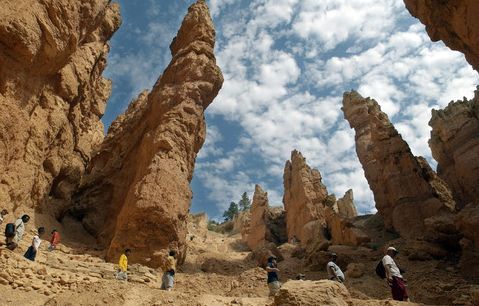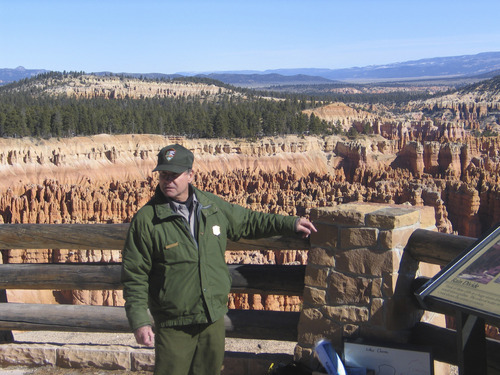This is an archived article that was published on sltrib.com in 2011, and information in the article may be outdated. It is provided only for personal research purposes and may not be reprinted.
Washington — National parks would be closed. Tax-refund checks would stop coming. And tens of thousands of Utahns may be furloughed.
Come Saturday morning, Americans might wake to find their federal government closed, as Congress deadlocks on passing a measure to keep agencies operating.
In Utah, a shutdown would smack the state's tourism industry as well as close down a major Internal Revenue Service office in the Ogden area and put government contractors on hold.
The chances of a governmentwide interruption looked more likely Wednesday, as both sides dug in during negotiations. President Barack Obama, House Speaker John Boehner and Senate Majority Leader Harry Reid met late Wednesday to try to hash out a last-minute deal.
At Ruby's Inn in southern Utah, workers were already bracing for the worst-case scenario that Bryce Canyon National Park - the area's big draw and a major engine for the local economy - might erect gates to restrict access.
"Our visitors come from all over the world - they're not just Utah folks," says Jean Seiler, marketing director at the Garfield County hotel that derives a majority of its business from visitors to public parks in the area. "How do you explain that to them? They've planned on this vacation and they're here, and now they can't see Bryce Canyon or any of the parks.
"Federal officials in Utah repeatedly referred questions to their respective headquarters in Washington, D.C., for comment on the possible impacts of a shutdown.
Interior Department spokeswoman Kendra Barkoff said the administration is still hoping to avoid a shutdown but is prepared in case it happens.
Barkoff says visitors to national parks, wildlife refuges and other government-managed lands should know that facilities will be closed in the event of a shutdown and any activities that require a permit will be canceled or postponed. Overnight visitors will be given 48 hours to find other accommodations.
The news isn't better in northern Utah, where the IRS has a major processing facility currently hustling to handle a flood of taxpayers' returns. In a shutdown, nonessential employees could be barred from working and go unpaid.
The IRS has about 4,100 workers in the state.
In case of a shutdown, taxpayers would still have to file taxes and pay money owed by April 18, though the IRS wouldn't be able to process paper returns until a budget in is place.
The impacts of a budget impasse would be felt all over Utah should congressional leaders fail to make a deal.
Federal courts, including the district court in Salt Lake City, could continue to operate for up to two weeks on funds raised from filing and copy fees. After that, they could face serious disruptions, according to the federal courts administration.
Residents called to federal jury service would still be expected to appear, though their payments would be held up, as would the pay for court-appointed defense attorneys and support staff.
It's unclear how much a shutdown would affect Hill Air Force Base, one of the state's largest employers. Nonessential civilian personnel might be barred from working - and go unpaid - while military personnel would likely stay on the job.
At Deseret Chemical Depot in Tooele County, officials expect most operations to continue, including protecting the stockpile of chemical weapons as well as the plant used to destroy them.
Some key government workers would be required to show up even if there is no federal budget, such as law enforcement officials, air-traffic controllers and emergency-response personnel.
Social Security benefits would continue to be processed, though no one new could sign up. The U.S. Postal Service, which is self-sustaining, would continue to operate.
The last time the federal government closed down - in 1995 and 1996 - it tossed hundreds of thousands of employees out of work, though essential workers were required to show up. During the four-day shutdown in 1995, some 800,000 people nationwide were furloughed, while the longer 21-day break a month later resulted in about 284,000 people being out of work.
If Congress doesn't act by 12:01 a.m. Saturday morning to pass a spending plan for the rest of the year - or at least another stopgap measure - the government again would be without a budget.
Rep. Jim Matheson, D-Utah, said such an action would represent a "failure of the legislative branch" and that he understands it could affect the lives of thousands in Utah.
"There are certain individuals on whom this has a direct impact. They're getting furloughed and they're not getting paid," Matheson said.
It may not be overly burdensome on employees if it's only a few days, he added, "but if it takes place and starts to extend for a longer period of time, that's real to people.
"A longer-term shutdown could cause even more pain in Utah and across the nation.
Local governments could start to see the hit from less tourism taxes; research grants, such as those going to Utah State University and the University of Utah, could be halted; and government projects such as moving tons of hazardous uranium tailings away from the banks of the Colorado River could be delayed.
Questions and Answers
Do you have a question about how a federal shutdown would affect you? Or do you already know how it would? Send your questions and stories to lisac@sltrib.com and we'll try to provide answers and information in our ongoing coverage at http://www.sltrib.com and in Friday's print edition.





